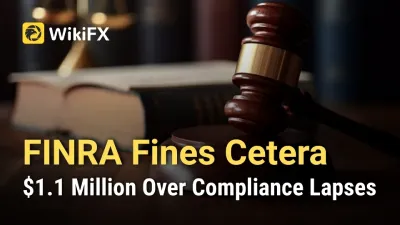Scrolled, Clicked, Lost RM166,000: Factory Worker Trapped by Online Investment Scam
A woman employed at a cake factory has lost her life savings after being lured into a fictitious investment scheme by a man she met on social media
简体中文
繁體中文
English
Pусский
日本語
ภาษาไทย
Tiếng Việt
Bahasa Indonesia
Español
हिन्दी
Filippiiniläinen
Français
Deutsch
Português
Türkçe
한국어
العربية
Abstract:UK Investment Advisers: New Capital Rules for Compensation Costs - Learn About Proposed Changes Impacting Investment Advice.

Investment advisers in the UK are facing a new regulatory proposal that would require them to hold additional capital to cover compensation costs. The goal is to address the rising costs associated with bad advice and guarantee that the businesses responsible for it suffer the financial burden. In this post, we will look at the proposed changes and their possible effect on the investment advice business.
Regulated enterprises in the United Kingdom are already required to contribute to the Financial Services Compensation Scheme (FSCS), which is regulated by the Financial Conduct Authority (FCA). This plan compensates customers who have incurred losses as a result of poor advice, with a maximum claim limit of £85,000 per claim.

Between 2016 and 2022, the FSCS paid out nearly £760 million for poor advice, and a significant portion of this cost was attributed to just 75 firms out of a market comprising approximately 5,000 firms. The rise in compensation claims has prompted regulators to take action.

The FCA is now proposing a “polluter pays” model, which means that firms responsible for providing poor advice should bear the financial consequences of their actions. This approach aims to create stronger incentives for advisers to enhance their standards and provide better advice to clients.
Sarah Pritchard, the FCA's executive director of markets and international, emphasized the need for change, stating, “Diligent advisers are having to compensate through the levy for the bad advice of their failed competitors. That needs to change. It is important that the polluter pays.”
The proposed regulations are designed to be proportionate, building upon the existing capital requirements. Firms would be required to calculate the additional capital needed to cover potential redress liabilities. However, approximately 500 one-person advice firms, unlimited partnerships, and firms within group-wide risk assessments would be excluded from this requirement.
During the public consultation period, the FCA plans to conduct a pilot scheme to assess firms' ability to provide the necessary data demonstrating how they have determined the extra capital requirement. The results of this pilot data collection will be considered alongside consultation responses before finalizing the rules.
According to the FCA, the yearly compliance expenses for these new laws would be about £1,000. These regulations are set to take effect in the first half of 2025. Advisers must previously put aside a minimum of £20,000 in capital in order to function.
The proposed “polluter pays” model has received a positive response from industry representatives. PIMFA, a trade body for financial advisers, welcomed the concept but urged for a proportionate approach that does not discourage new entrants into the industry.
The proposed regulatory changes in the UK aim to hold investment advisers accountable for the quality of their advice and the financial consequences of poor decisions. By implementing a “polluter pays” model, the FCA intends to incentivize advisers to improve their standards and reduce the burden on diligent firms that have to compensate for the failures of their competitors. These changes are set to have a significant impact on the investment advisory sector, with the potential to enhance overall industry standards and protect the interests of clients.

Disclaimer:
The views in this article only represent the author's personal views, and do not constitute investment advice on this platform. This platform does not guarantee the accuracy, completeness and timeliness of the information in the article, and will not be liable for any loss caused by the use of or reliance on the information in the article.

A woman employed at a cake factory has lost her life savings after being lured into a fictitious investment scheme by a man she met on social media

Entering 2026, diverging central bank policies are reshaping global FX and bond markets, while economic momentum shifts from developed economies toward India. Meanwhile, an upcoming leadership transition at the US Federal Reserve presents a key underappreciated risk that could trigger renewed volatility in interest rates and the US dollar.

FINRA fines Cetera $1.1 million for supervisory and AML compliance failures spanning several years, citing rule violations and weak oversight systems.
FINRA fines Cetera $1.1 million for supervisory and AML compliance failures spanning several years, citing rule violations and weak oversight systems.
